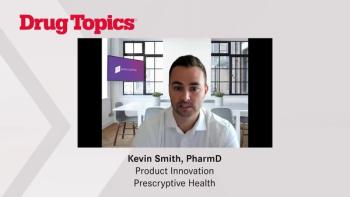
Under GE, pharmacy software expanding in use
M.D. Anderson Cancer Center is latest hospital to adopt GE's pharmacy software
HEALTH-SYSTEM EDITION
TECHNOLOGY
Under GE, pharmacy software expanding in use
The University of Texas M. D. Anderson Cancer Center in Houston recently signed a 10-year agreement with GE Medical Systems Information Technologies in Milwaukee, to license the GE Centricity Pharmacy software system.
The system provides patient safety features of interest to cancer care, said Sunny Sanyal, GE's VP of clinical information systems. Features include support of dose checking beyond that provided by commercial drug databases, the tracking of lifetime chemotherapeutic dosing, and an option that allows hospital pharmacists to predefine protocols.
"Commercial databases lack certain in-depth chemotherapeutic and pediatric dosing information, which represent the most complex care provided today," explained Sanyal. "Our [software] tool enables each healthcare institution to implement clinical dosing parameters beyond those offered by commercial databases, as the order is processed by an existing computerized provider order entry system or, in the case of paper orders, our system's internal order interface."
The M. D. Anderson decision to license Centricity Pharmacy followed a five-year approval and planning period, related Roger W. Anderson, Dr.P.H., VP for pharmacy at M. D. Anderson. "Our decision was based primarily on its ability to integrate with our ongoing computerized physician ordering entry and electronic medical record upgrade and the company's ability to provide product support," he said.
GE acquired the Centricity Pharmacy system when it purchased BDM Information Systems Ltd., of Saskatchewan, Canada, in December 2002, which marketed the system under the name BDM RxTFC Pharmacy Management software. It is being used at 125 sites in the United States and Canada, representing 34,000 patient beds, and has recorded nearly five billion doses in 250 million orders and provided care for more than 26 million patients, said GE officials.
M. D. Anderson is the latest cancer center to license Centricity Pharmacy. Memorial Sloan-Kettering Cancer Center in New York did so in 2001 and oncology centers at Johns Hopkins in Baltimore and the University of California, Los Angeles, licensed BDM RxTFC in the late 1990s. A critical value of the system to Sloan-Kettering is enhanced patient safety, remarked Raymond J. Muller, R.Ph., associate director of the division of pharmacy services. "It is crucial for health-system pharmacies to have centralized systems for ensuring the accuracy of chemotherapy dosing," he noted. "When an error occurs, it's rarely the re sult of a single individual's actions. It's almost always a systemwide issue."
To reduce system errors, Centricity Pharmacy flags chemotherapy doses that exceed preset limits, said Muller. The doses can be legitimate, but a pharmacist must receive written approval from one of only five Sloan-Kettering oncologists authorized to override the halt.
Another important feature of Centricity's ability to enhance patient safety is lifetime-dose tracking, Sanyal continued. "There is a small subset of drugs available that can place patients at risk if they receive total, aggregate doses in excess of predefined levels over their lifetime," he said.
Centricity's ability to allow pharmacists to adjust protocols was an important feature to M. D. Anderson. "Clinicians can simply click a button to enter an institutionally predefined order set," Sanyal explained.
Centricity Pharmacy is part of GE's Centricity Enterprise Clinical Information System, an IS that offers products across all areas in a health system, including inpatient and outpatient settings. "For Enterprise users, a medical record is maintained in a unified repository and pharmacy users have equal access to all appropriate patient information necessary to provide excellent care," Sanyal said.
Recognizing that lifetime-dose tracking may require compatibility with other pharmacy software systems, GE is moving toward true portability and interoperability, Sanyal said. "Currently, patients who move to another provider that practices in a Centricity environment would be able to digitally transfer their records to another Centricity user," he noted. "But we're committed to the open standards proposed at the governmental level that would maximize the safe portability of a patient's lifetime medical record."
M. D. Anderson anticipates implementation of the GE system by the end of next year. "Integration of this system at this institution will be a big job," Anderson commented, "and they are giving us excellent support in getting it there."
At press time, GE announced that another hospital has signed up with Centricity PharmacyOregon Health & Science University.
Martin Sipkoff
The AUTHOR is a writer based in the Philadelphia area.
Martin Sipkoff. Under GE, pharmacy software expanding in use.
Drug Topics
Dec. 8, 2003;147:HSE26.
Newsletter
Pharmacy practice is always changing. Stay ahead of the curve with the Drug Topics newsletter and get the latest drug information, industry trends, and patient care tips.























